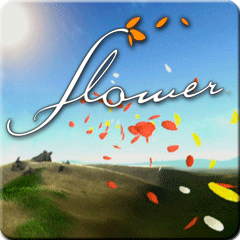Flower is a monumental achievement bound to be discussed by both
The modern gaming landscape is littered with countless sequels and me-too copycats lacking any form of originality. Even those few games that attempt to do something fresh usually fall into the traps set by previous games, with archaic features like limiting save-points, incompetent AI, or even more generally, a classic zero sum architecture, in which there is a clear winner and a clear loser. As our medium evolves though, the term "game" becomes more limiting, as new interactive art pieces create gaming experiences that transcend the classic win/loss structure that games of all types have been historically based upon.
One such game is Flower by Thatgamecompany and Sony Computer Entertainment. Some will decry Flower as heresy, saying it undermines the very definition of a video game, and in a sense, they will be right. Flower isn't like any game you have played before, and whether you can stomach its unique blend of interactivity and social commentary will be entirely dependent on your ability and desire to see games as something more than the toys that Nintendo so desperately wants to make them into.
Flower is more a piece of interactive art than a game. You play as the wind, guiding flower petals into flowers to make them bloom, thereby adding their petals to your ever increasing chain. You steer the wind with the motion controls and move forward by hitting any button on the controller. It is easy to pick up and easy to master. You never earn any new powers, and the entire game is built around variations of this basic premise. If you think that sounds shallow then you'd be right. Flower isn't about deep, demanding gameplay. If you play games to master complex controls or develop ever more powerful characters then Flower isn't the game for you. Flower is about experiencing the world created for the player, and it is inarguably better for it.
Flower delivers a powerful and moving message about the dangers of industrialization and the beauty and majesty of nature. It does this without any dialogue, settings, or characters. In the ongoing battle between ludology and narratology, Flower is definitive proof that narrative and gameplay can not only coexist but can work together to deliver a more powerful message than either could separately. The story in Flower is told through gameplay. While traveling through these six unique worlds players experience a range of emotions that are rarely generated in a gaming space. Flower proves that games don't need complex narratives with dozens of characters and apocalyptic settings to be successful. It's simple story and lack of characters or dialogue transcend the limitations that constrain print and film media. This is truly a story that could only be told with a game.
While gamers often claim that graphics and audio are secondary to gameplay, Flower is an atypical example. Flower makes good use of narrative spaces, a storytelling technique best suited to interactivity, in which the story is told less through characters and more through the settings in which the characters are situated. Flower's incredible audiovisual presentation is paramount in delivering its message. The beauty of the first four levels makes the player care deeply for the well being of the world presented to him. Each blade of grass is individually animated, and each flower has its own note associated with it. The player can make a virtual symphony that changes the soundtrack dynamically depending on what flowers the player adds to his chain. Flower attempts to prove that nature is a piece of art, and through the successful blend of interactive music and technically and aesthetically superb graphics it succeeds gloriously. When the setting turns dark in the final two levels the player feels the change in tone. While the mechanics remain the same, the game fundamentally changes solely through the alteration of audiovisual style. Essentially, by using narrative spaces instead of classic literary means of storytelling, Flower increases the importance of presentation, making variations in mood the primary aspect of both the narrative and gameplay variety.
Flower is a truly monumental achievement of interactive fiction. It is fitting that Thatgamecompany, with its origins in academia, would be the one to take the academics back to the drawing board, delivering a game with both a story and a message, while leaving out entirely the backbones of classic literary and cinematic narratives. There may be no characters, enemies, or even a way to lose, but Flower is stronger for it, pushing the medium in a new direction. Whether that direction, pulling elements from the controversial New Games movement, is the right direction for the industry will undoubtedly be argued by gamers and scholars worldwide for years to come, especially as the era of widely distributed, cheaply made, indie games continues to flourish in this age of online distribution. What is inarguable though is that Flower will surely prove to be a seminal work in gaming history.
